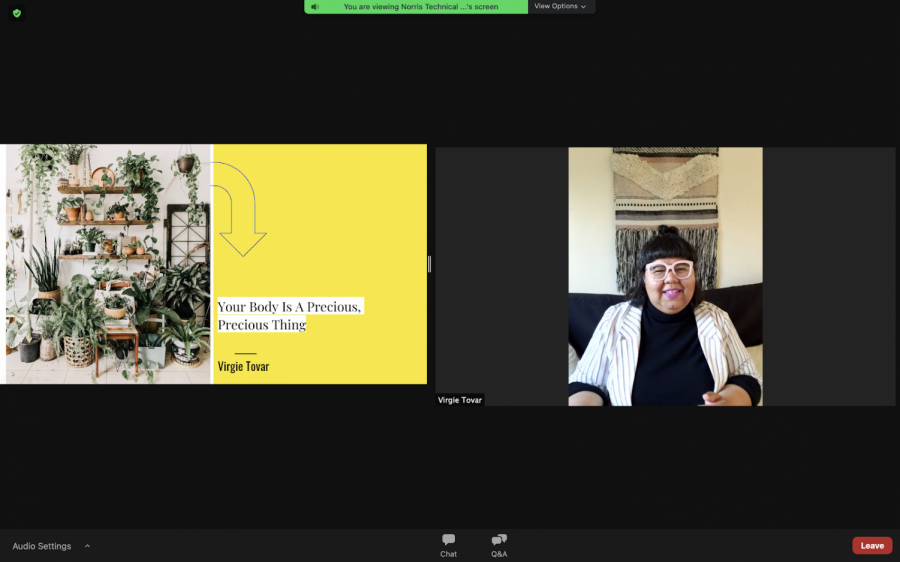Activist and author Virgie Tovar discusses body positivity, diet culture for Body Acceptance Week
Activist Virgie Tovar discusses the importance of body acceptance and the impacts of diet culture at an event hosted by NU College Feminists.
February 26, 2021
Body image activist Virgie Tovar spoke to the importance of an intersectional approach to health and weight discrimination in a guest lecture Thursday.
In an event organized by NU College Feminists a part of the University’s Body Acceptance Week, Tovar, an expert on weight-based discrimination, discussed the impact of fatphobia on diet culture and body image.
Tovar first defined fatphobia in a modern context, describing how its origins can be traced to slavery and colonialism. She went on to discuss how the world’s current fixation on diet culture and weight loss negatively impacts people’s relationship with food, sharing personal anecdotes from her podcast, “Rebel Eaters Club.”
“Weight loss is not the solution to our food anxieties or discrimination,” Tovar said. “All bodies are valuable, health is not a condition of human rights and should never be. Dieting is an inefficacious, unscientific behavior correlated with anxiety, depression and eating disorders, not improved health.”
Body Acceptance Week aims to coordinate articles, speakers, resources and activities to highlight the importance of self-compassion, body positivity and intuitive eating. This year’s theme, “Every Body: Come As You Are,” explores body acceptance through an intersectional lens.
McCormick junior and NUCF president Divya Sharma said she was inspired by the intersectionality in Tovar’s approach to racism, sexism and classism in her previous discussions about weight discrimination.
Sharma also said Tovar’s talking points, ranging from diet culture manifestations to the future of size acceptance, were especially relevant to a student audience.
“For college students especially, the interpersonal aspect (of diet culture) is huge,” Sharma said. “There’s a lot of social activities related to eating and kind of involved with body image, and it becomes really normalized to restrict yourself in terms of eating and also in terms of justifying what you eat.”
Weinberg junior Jimena Collado, who had read Tovar’s book “You Have the Right to Remain Fat” beforehand, came into the lecture with some idea of the toll an unhealthy relationship with weight can have on personal connections, school performance and extracurricular activities.
Still, she said she found Tovar’s examination of the social aspect of diet culture shocking. Tovar said on Thursday that the social determinants of weight discrimination are reliant on a combination of intrapersonal, interpersonal and institutional relationships instead of depending on a single factor.
“I think that (discussing social influences) was very crucial in her argument of how intertwined social justice is with diet culture,” Collado said. “Having events that help you move towards that goal of loving yourself and accepting your body, it’s really important for our collective health.”
Tovar concluded her talk with a look into the future she’s fighting for, one without the constraints of diet culture. She said “when we are fighting for justice, we are fighting for joy” but ultimately, the beauty of the future is something even she can’t imagine.
“Every single person, regardless of body size or health status, deserves to live a life free from bigotry and discrimination,” Tovar said. “(They have) the right to access good things and the right to thrive.”
Email: [email protected]
Twitter: @sam_lebeck
Related Stories:
— Chicago dietitian Megan Campbell talks food positivity and body acceptance
— Students reflect on body positivity, engage with body acceptance initiatives
— Speak Your Mind: CAPS Body Acceptance Week gives space to discuss eating disorders


